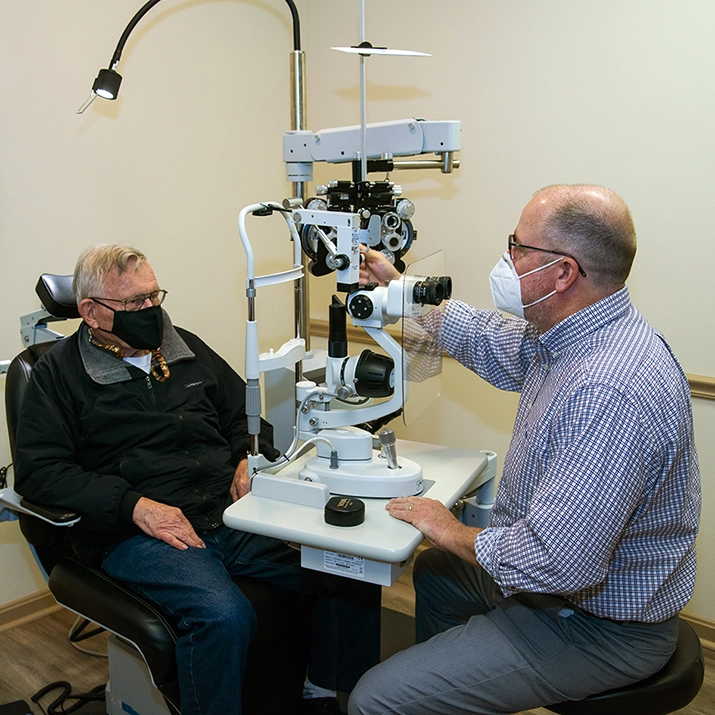Macular Degeneration
Age-Related Macular Degeneration (AMD)
Macular degeneration, also called age-related macular degeneration (AMD), is a condition that occurs when the macula — the small central portion of your retina, wears down.
Overview
What is macular degeneration (AMD)?
Macular degeneration is the leading cause of vision loss, affecting more than 10 million Americans—more than cataracts and glaucoma combined. Although macular degeneration doesn’t usually cause full blindness, it can make it nearly impossible to read, recognize faces, drive, watch television, or perform other detailed visual tasks. With AMD, the health of the peripheral (side) vision remains unaffected.
What are the different types of macular degeneration?
There are two different types of macular degeneration—dry (or non-exudative) AMD and wet (or exudative) AMD.
Dry (Non-Exudative) AMD
- Dry AMD is the most common form, affecting roughly 80–90% of people diagnosed.
- Dry AMD occurs when a buildup of proteins (tiny yellow spots called drusen) occurs in the macula. As the condition worsens, the light-sensitive cells in the macula begin to get thinner, and eventually, the cells die. In most cases of dry AMD, people notice a gradual, painless loss of vision that progresses with time. Dry AMD can progress into wet AMD if left untreated.
Wet (Exudative) AMD
- Wet AMD is rarer but more serious, affecting roughly 10–20% of people with AMD.
- Wet AMD causes vision loss due to abnormal blood vessel growth, ultimately leading to blood and protein leakage, causing scarring of the macula. Vision loss from wet AMD is often faster than with dry AMD.
When to call the doctor
Early signs of vision loss from AMD include shadowy areas in your central vision or unusually fuzzy or distorted vision. Some patients may notice wavy or warped words when reading. If you experience these or any other changes in your vision, make an appointment with your provider. Yearly comprehensive eye examinations are also recommended as preventative care, especially for those 65 and older.
Symptoms
What are the symptoms of macular degeneration (AMD)?
Early signs of vision loss caused by AMD can include worse or less clear vision, dark and blurry areas in the center of your vision, and different color perception.
Other symptoms of macular degeneration include:
- A reduction in central vision
- The need for brighter lighting/difficulty adapting to low lights
- Blurriness
- Trouble recognizing faces
- Straight lines starting to appear wavy, blurry or missing
- Fading and/or changes in the appearance of colors
Diagnosis
How is macular degeneration (AMD) diagnosed?
In most cases, macular degeneration can be diagnosed following an eye exam. One of the most common early signs is the appearance of drusen, tiny yellow spots under your retina, that your doctor can see when they examine your eyes. You may also be asked to look at an Amsler grid, which helps you to notice any blurry, distorted, or blind spots in your field of vision.

Treatment & Prevention
How is macular degeneration (AMD) treated?
Currently, there is no known cure for macular degeneration, but there are things you can do to reduce your risk and slow the progression once you’ve been diagnosed. The treatment approach your doctor takes depends on whether the AMD is dry or wet.
Some options are:
Vitamins (Dry AMD)
Anti-Angiogenesis Drugs (Wet AMD)
Laser Therapy (Wet AMD)
Low Vision Aids
How can macular degeneration (AMD) be prevented?
Since some of the risk factors like obesity and smoking can be controlled, it’s important to exercise regularly and not to smoke. Regular eye exams are also an excellent tool in combating macular degeneration, since doctors can often diagnose AMD before the onset of symptoms. As always, be sure to contact your doctor if you experience any vision changes.